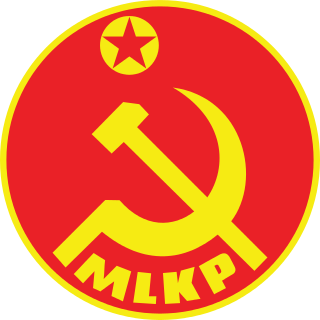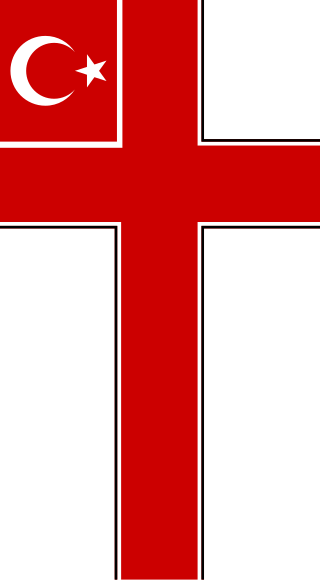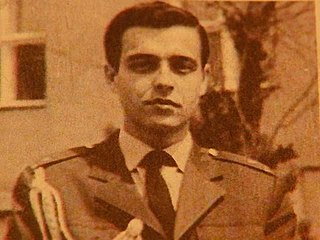Jandarma İstihbarat ve Terörle Mücadele or Jandarma İstihbarat Teşkilatı is the intelligence department of the Turkish Gendarmerie. JİTEM was active in the Kurdish–Turkish conflict. After the Susurluk scandal, former prime ministers Bülent Ecevit and Mesut Yılmaz have confirmed the existence of JİTEM.

The Marxist–Leninist Communist Party is an underground Hoxhaist communist party in Turkey. It was founded in 1994, and has been involved in the Rojava conflict since 2012.

The Autocephalous Turkish Orthodox Patriarchate, also referred to as the Turkish Orthodox Church, is an unrecognized autocephalous Eastern Orthodox organisation based in Turkey, descending from Turkish-speaking Eastern Orthodox Christians. It was founded in Kayseri by Pavlos Karahisarithis, who became the patriarch and took the name of Papa Eftim I, in 1922.
Bedrettin Dalan is a Turkish engineer, former politician and the first mayor of Greater Istanbul. He is the founder of İSTEK Vakfı, a foundation for education and culture, and Yeditepe University in Istanbul.
In Turkey, the deep state is a group of influential anti-democratic coalitions inside the Turkish political structure, composed of high-level elements within the intelligence services, the Turkish military, security agencies, the judiciary, and mafia. The political agenda of the deep state network purportedly involves an allegiance to nationalism, corporatism, and state interests. Violence and other means of pressure have historically been employed in a largely covert manner to manipulate political and economic elites, ensuring that specific interests are met within the seemingly democratic framework of the political landscape. Former president Süleyman Demirel said that central to the outlook and behavior of the predominantly military elites who constitute the deep state, is an effort to uphold national interests which have been shaped by an entrenched belief, dating back to the fall of the Ottoman Empire, that the country is always "on the brink".
Reis Sedat Peker is a Turkish mafia boss and whistle-blower who has made various allegations about Turkish politicians and numerous government engagements in illegal activities through his own YouTube channel. He has described himself as a pan-Turkist and Turanist.
The Zirve Publishing House murders, called the missionary massacres by Turkish media, took place on April 18, 2007, in Zirve Publishing House, Malatya, Turkey. Three employees of the Bible publishing house were attacked, tortured, and murdered by five Muslim assailants.
Ergenekon was the name given to an alleged clandestine, secular ultra-nationalist organization in Turkey with possible ties to members of the country's military and security forces. The would-be group, named after Ergenekon, a mythical place located in the inaccessible valleys of the Altay Mountains, was accused of terrorism in Turkey.
Epic of Ergenekon or Ergenekon Epic is a founding myth of Turkic and Mongolic peoples.

Tuncay Güney, code name "Ipek" (silk), is a Turkish citizen of Dönmeh Jewish origin who claims to have infiltrated the Turkish Gendarmerie's intelligence organization JITEM, Ergenekon, the Workers' Party, and the Gülen movement before being outed. He is subordinate to Mehmet Eymür, who was discharged from the National Intelligence Organization. The information Güney has gleaned on these organizations make him a key figure in the ongoing Ergenekon investigation. His statements form the backbone of the 2455-page Ergenekon indictment, which mentions him 492 times and labels him a suspect at large.
The Ergenekon trials or the Ergenekon conspiracy, were a series of high-profile trials which took place in 2008–2016 in Turkey in which 275 people, including military officers, journalists and opposition lawmakers, all alleged members of Ergenekon, a suspected secularist clandestine organization, were accused of plotting against the Turkish government. The trials resulted in lengthy prison sentences for the majority of the accused. Those sentences were overturned shortly after.

The Imam's Army is a book by Turkish journalist Ahmet Şık on the life and work of Fethullah Gülen and his Gülen movement. Şık was detained in March 2011, before the book was published, and the draft book was seized by the government and banned, claiming it was an "illegal organizational document" of the secret organization Ergenekon. Şık was detained pending trial, being eventually released pending trial in March 2012. In the interim, in an act of anti-censorship defiance, a version of the book was released in November 2011 under the name 000Kitap (000Book), edited by 125 journalists, activists and academics, and published by Postacı Publishing House.
Veli Küçük is a retired Turkish brigadier-general. He is thought to be the founder of the JİTEM intelligence arm of the Turkish Gendarmerie, and is accused by the Turkish government of being the head of the Ergenekon organization, based on testimony by Tuncay Güney. He was arrested in January 2008, and on 5 August 2013, sentenced to two consecutive life sentences.
OdaTV(also known as Odatv.com, Odatv or odaTV), an online news portal based in Turkey, was founded in 2007. It is one of the most followed news portals in Turkey and according to the Alexa statistics, it is the 119th most visited website in the country (Turkey).

Ahmet Cem Ersever was a commander in the Turkish Gendarmerie, and said to be one of the founders of the Gendarmerie's JITEM intelligence unit. He was assassinated in November 1993. His girlfriend and translator Nevval Boz was also assassinated, along with İhsan Hakan, a former PKK member.
Memduh Ünlütürk was a Turkish general associated with the Counter-Guerrilla and the anti-communist Ziverbey interrogations following the 1971 coup. He was assassinated at his Istanbul home by members of the left-wing revolutionary group Dev Sol. It has been suggested that he was assassinated to protect the secrets of the Turkish deep state; Dev-Sol (DHKP/C) has been accused of links to the Ergenekon organization.
Levent Ersöz is a former Turkey brigadier general in the Turkish Gendarmerie, who was head of the Gendarmerie's JITEM intelligence department. He was considered a key defendant in the Ergenekon trials, and on 5 August 2013 was sentenced to 22 years and six months. He was released on 11 March 2014. A trial charging Ersöz with the death of Turkish President Turgut Özal in 1993 began in September 2013. Ersöz was found innocent and received an amnesty in March 2016.
TUSHAD was a clandestine organization within the Turkish Armed Forces, including within the General Staff of Turkey. Prosecutors in the Ergenekon trials allege that it was set up in 1993 on instructions from Ergenekon, by then secretary-general of the General Staff Hurşit Tolon. Tolon has denied that TUSHAD ever existed.

İlhan Cihaner, is a Turkish leftist politician and a former prosecutor. He's a parliamentary deputy for the Republican People's Party (CHP) since 2011. He was the Chief Public Prosecutor of Erzincan from 2007; he resigned in 2011 in order to stand for election. He is a suspect in the Ergenekon trials. He is a columnist for the soL newspaper.
Turkish mafia is the general term for criminal organizations based in Turkey and/or composed of current or former Turkish citizens. Crime groups with origins in Turkey are active throughout Western Europe and less so in the Middle East. Turkish criminal groups participate in a wide range of criminal activities, internationally the most important being drug trafficking, especially heroin. In the trafficking of heroin they cooperate with Bulgarian mafia groups who transport the heroin further to countries such as Italy. Recently however, Turkish mafia groups have also stepped up in the cocaine trafficking world by directly participating in the massive cocaine smuggling pipeline that runs transnationally from South America to Europe. They allegedly have a lucrative partnership with the Venezuelan drug-trafficking organization known as the Cartel of the Suns who ships them cocaine along with criminal elements from Ecuador. Turkish organized crime has pushed into less traditional cocaine markets as well such as into Eastern Europe, the Caucasus, and the wealthy petro-states of the Persian Gulf. Cosa Nostra and the Turkish mafia are also known to be very close. Criminal activities such as the trafficking of other types of drugs, illegal gambling, human trafficking, prostitution or extortion are committed in Turkey itself as well as European countries with a sizeable Turkish community such as Germany, Netherlands, Belgium, Albania, and the United Kingdom.





